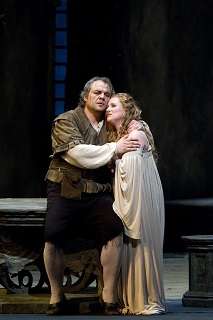|
Back
Rigoletto Returns New York
The Metropolitan Opera
04/26/2011 - & April 30, May 3, 6, 2011
Giuseppe Verdi: Rigoletto
Zeljko Lucic (Rigoletto), Diana Damrau (Gilda), Giuseppe Filianoti (The Duke of Mantua), Stefan Kocán (Sparafucile), Nancy Fabiola Herrera (Maddalena), Quinn Kelsey (Monterone), Teresa S. Herold (Giovanna), Jeremy Galyon (Count Ceprano), Corinne Winters (Countess Ceprano), Mark Schowalter (Borsa), Joshua Benaim (Marullo)
Metropolitan Opera Chorus, Donald Palumbo (Chorus Master), Metropolitan Opera Orchestra, Fabio Luisi (Conductor)
Otto Schenk (Production), Zack Brown (Set and Costume Design), Gil Wechsler (Lighting Design), Gregory Keller (Stage Director)

Z. Lucic, D. Damrau (© Marty Sohl/Metropolitan Opera)
Rigoletto has returned to the Met with the fourth cast of the season and two revelatory performances – Diana Damrau as Gilda and Fabio Luisi in the pit. The Met Orchestra played brilliantly for him as they did when I saw him last season, conducting Tosca in April and Elektra the previous December. Luisi provided a highly dramatic, fluid and nuanced reading beginning with a prelude pregnant with foreboding and menace. The curse that was to blight and finally destroy Rigoletto hung in the air like a brooding cloud, encapsulating all the tragedy of the opera. During the court scenes, Luisi gave us high spirits and animation. He has such range and such command over the Met Orchestra as well as obviously great rapport. It’s no wonder he has recently been named Principal Guest Conductor.
And when Maestro Luisi has a brilliant and dramatically committed solo singer to work with – here, Diana Damrau as Gilda – he is the most sensitive of musical collaborators. She inhabited the role totally – with her voice, her posture, and even her gait. Her portrayal of an utter innocent in “Caro nome” with the girlish excitement of first love, made the Duke’s cynical exploitation of her and the later sacrifice of her life for his almost unbearably poignant. Damrau’s wide stylistic and interpretive range have been on full display this season, with her Gilda (only two performances) coming hot on the heels of her triumph as Adèle in Rossini’s Le Comte Ory. As Gilda, she sang with luminous tone, spot on intonation and marvelously characterful phrasing. Her coloratura seemed to flow as a natural expression of her character. This all came together with a lovely messa di voce to portray an exquisite vulnerability.
Alas, even Luisi’s superb conducting and Damrau’s peerless Gilda could do little to enliven and deepen the performance of the evening’s Rigoletto, Zeljko Lučic, which was often vocally weak with choppy phrasing and always dramatically inert. What characterization there was seemed applied, not embodied. In his scenes with Damrau, there was simply no dramatic engagement on his part. Interestingly, in my colleague’s review of the first cast of Rigoletto this season, he had a very similar reaction to a different singer’s performance in the role of the title character.
As for Lucic, what a difference from the last Rigoletto I saw in the house, George Gagnidze! In Rigoletto’s two key arias, “Pari siamo” and “Cortigiani, vil razza dannata,” Lučic conveyed no real complexity of character in the former and no transformation from anger to pathos in the latter. What a contrast not just to Damrau and Gagnidze, but to his own compelling performance last season as Michele in Il tabarro.
Recently tenor Giuseppe Filianoti revealed that he had undergone cancer treatment that adversely affected his voice, but a string of positive reviews in the past year indicated that his vocal problems were behind him. Unfortunately his portrayal of the Duke was marked by cut off phrases and tightness at the top of his range. He sounded as if he had a cold, so we can hope that this marked only a temporary indisposition.
Stefan Kocán was a dark and sinister Sparafucile, but he lacked the vocal beauty of the marvelous Mikhail Petrenko in the Gagnidze cast of two years ago. Nancy Fabiola Herrera as Maddalena sang with a lovely deep, dark voice and showed she is a fine singing actress.
The Otto Schenk production – said to be its last appearance at the Met before a new production by Luc Bondy is unveiled – seemed surprisingly unfamiliar. A note in the program explained that it was the travel version – a sort of Schenk shrunk – substituting for its bulkier counterpart in order to fit on the Met stage along with the Met’s vast unit set for the new Ring, lurking somewhere out of sight. The set’s story-book look seemed extraordinarily old fashioned, even by the standards that have long prevailed at the Met. Seated next to me was a couple from Munich. During the intermission they both expressed great pleasure in seeing such a traditional production compared with what they were used to seeing at home.
Arlene Judith Klotzko
|